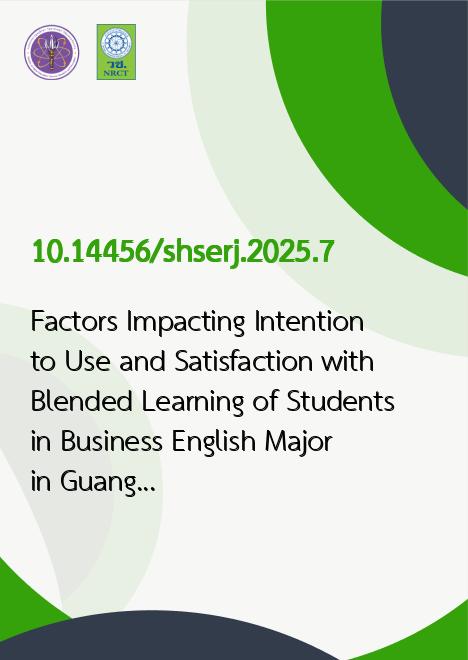
|
Factors Impacting Intention to Use and Satisfaction with Blended Learning of Students in Business English Major in Guangdong, China |
|---|---|
| รหัสดีโอไอ | |
| Creator | Yingzhi Fang |
| Title | Factors Impacting Intention to Use and Satisfaction with Blended Learning of Students in Business English Major in Guangdong, China |
| Publisher | Assumption University Press |
| Publication Year | 2568 |
| Journal Title | The Scholar: Human Sciences |
| Journal Vol. | 17 |
| Journal No. | 1 |
| Page no. | 66-77 |
| Keyword | Satisfaction, System Quality, Information Quality, Social Identity, Intention to Use |
| URL Website | http://www.assumptionjournal.au.edu/index.php/Scholar/article/view/7515 |
| Website title | The Scholar: Human Sciences |
| ISSN | 2586-9388 |
| Abstract | Purpose: This study investigates the factors impacting intention to use and satisfaction with blended learning business of students in business English major in Guangdong, China. The research framework includes four independent variables: system quality, social identity, information quality, and student interaction; one dependent variable: satisfaction; and a mediator: intention to use, which mediates the relationship between social identity and satisfaction. Research design, data, and methodology: The study used questionnaires and collected 500 samples from the School of Foreign Languages at Zhanjiang University of Science and Technology (ZUST). The target population and sample size are chosen by purposive sampling with 500 undergraduates majoring in Business English, and have at least one month of the blended learning experience. Stratified random sampling is based on the undergraduates in different grades. Online questionnaire is used per convenience sampling. Structural equation modeling and confirmatory factor analysis were conducted. Results: The results show that system quality, social identity, information quality, and student interactions have a significant impact on satisfaction with blended learning. Intention to use mediate the relationship between social identity and satisfaction. Conclusions: The findings suggest that comprehensive factors, including the quality of blended learning, social relationship, cognition, and attitude toward identity, cause the improvement in students satisfaction with blended education. |
